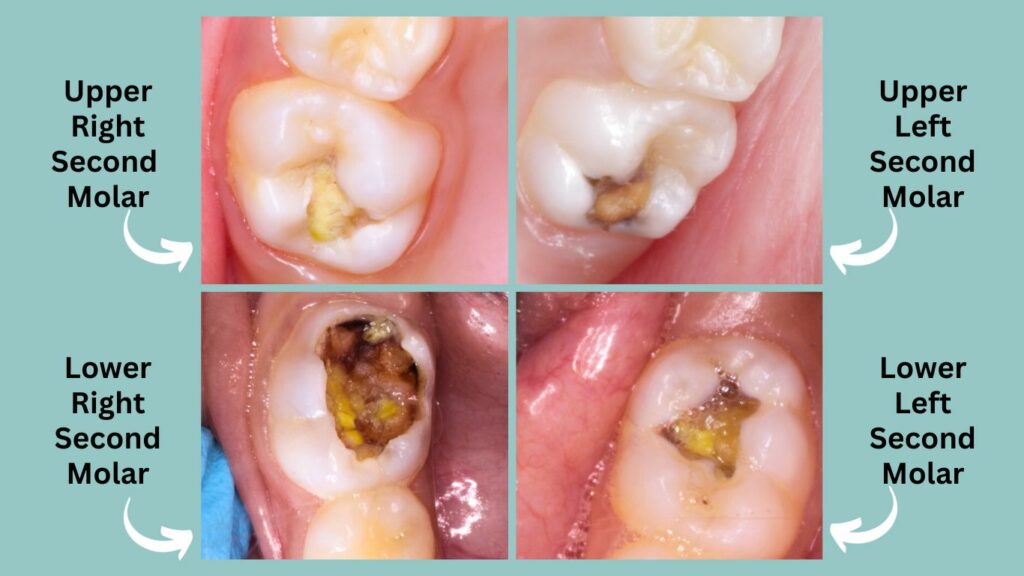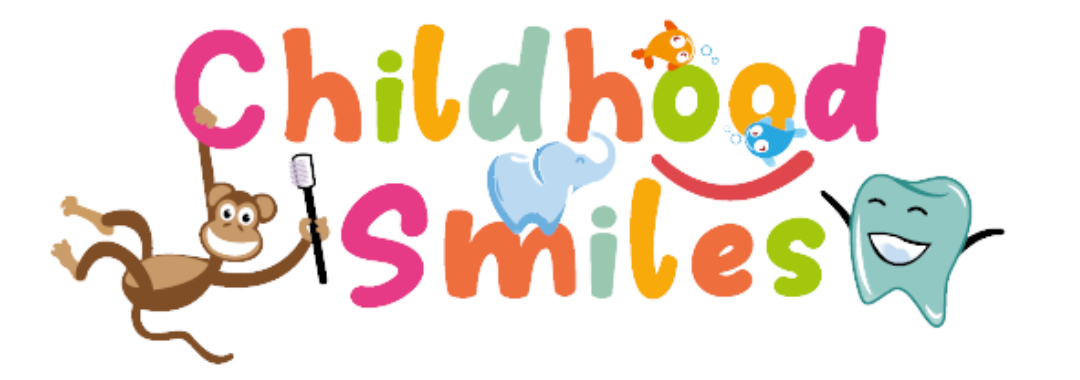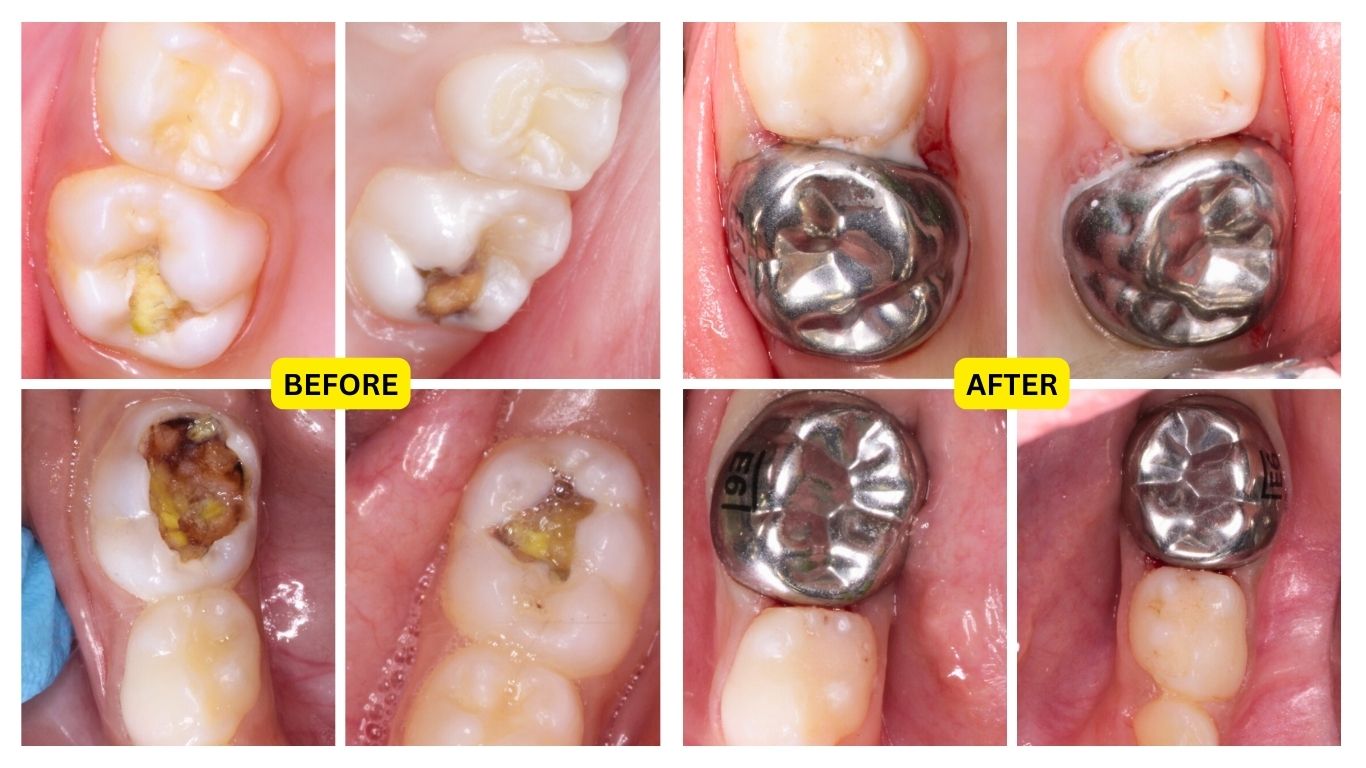Empowering Smiles: General Anesthesia in Pediatric Dentistry for Special Children
Table of Contents
General anaesthesia can be helpful for dental care in children with special health conditions like autism spectrum disorder who may not cooperate during chairside dental treatments. It makes the whole process safer because the airway is completely under control. Child is completely still and calm, reducing all the chances of sudden movements or distress. It also makes dental treatment more efficient because multiple procedures can be done in one session, providing qualitative care and reducing trips to the dentist.
In this inspiring patient story, discover how we delivered comprehensive dental care to a child with special health needs, improving his oral health and enabling him to enjoy his food without pain and his life with a brighter smile, using general anaesthesia.
Overview
Name: Confidential
Gender: Male
Age: 4 Years
Any Medical problem: Autism Spectrum Disorder, Global Developmental Delay, Visual Impairment, Epilepsy
Treatment: Rehabilitation of Eight Molar Teeth
Doctor: Dr. Debarchhana Jena
Case Introduction
A visually impaired young patient with autism spectrum disorder, global developmental delay and epilepsy recently visited Childhood Smiles, Bangalore, with his parents seeking relief from dental pain due to deep dental caries in multiple molar teeth. Understanding the unique challenges that come with the autism spectrum, developmental delay and visual impairment we approached the situation with utmost care and patience. However, due to limited cooperative ability and lack of communication, the initial counselling session and the subsequent examination, including the minor procedure involving dental X-rays was challenging. Despite the inherent difficulties, our team remains committed to providing the best possible care, ensuring the child’s comfort and well-being throughout the treatment process. We followed the same principle and protocol in his case.

Chief Complaint
The child had pain in his back teeth, both on the top and bottom, and it was making him really uncomfortable. Parents reported the pain was constant, that wouldn’t go away. The worst part is he would not express his pain by words rather only by action that is hitting his cheek or grinding his jaw vigorously. He even stopped taking food. Initially parents didn’t know it was because of cavities. Later once they visited us they got to know what the real issue was.
Diagnosis / Medical Assessment
After a thorough examination and X-ray, We found that the child has deep cavities in all four-second molar milk teeth and initial cavities in all four first molar teeth.There was plaque and soft debris which made us understand the oral hygiene measures were not appropriate for him, worsening his dental health.
Treatment Plan
The treatment plan was devised, keeping the child’s medical and dental condition in account. As the child had multiple health conditions and almost zero communication ability, we suggested doing the treatment under general anaesthesia. We also coordinated with the child’s neurologist and paediatrician to plan smooth dental rehabilitation.
The treatment included the management of deep dental caries (removal of debris and grossly decayed parts to prevent further infection, followed by root filling and Stainless Steel Crown for all four second molar teeth to make them strong and restore the chewing ability). The treatment plan also included cleaning the deposited plaque and soft debris followed by application of fluoride varnish to all the teeth and sealants to the first molar teeth as a preventive treatment to avoid any future problem. The aim of treatment was to restore the function of teeth, get rid of pain, and allow him to enjoy the healthiest smile possible in order to enjoy life to the fullest.




Why Did We Suggest The Treatment Under General Anesthesia?
We recommended general anesthesia for this young patient’s dental treatment keeping his overall health condition of autism spectrum disorder, global developmental delay, epilepsy and visual impairment. He had limited ability to cope with dental treatment requiring multiple visits. Utilizing general anesthesia for dental care in patients with special health needs offers several benefits. It ensures safety by eliminating the risk of unpredictable adverse reactions during procedures due to sensory and neurological issues, airway related difficulties and communication challenges. Furthermore, the treatment under general anaesthesia minimises the stress associated with multiple dental appointments. In this patient’s case multiple visits were absolutely not possible and cooperation was almost appropriate enough to carry out challenging lengthy dental treatment procedures. Hence our Paediatric dental team suggested general anaesthesia.
![]() Few of the benefits
Few of the benefits
1. Coping Up with Limited Cooperation: Children with special health conditions like autism spectrum or global developmental delay may have difficulty cooperating during dental procedures due to sensory issues, oral aversion, severe anxiety, or communication challenges. Under General anaesthesia there is no movement of the child and hence paediatric dentists are not dependent on the child’s cooperation for the procedure.
2. Safety: General anaesthesia provides a controlled and safe environment for dental work, reducing the risk of any airway related issues, sudden body movements or adverse reactions from the child that could lead to injury.
3. Efficiency: Performing dental procedures under general anaesthesia allows us to complete multiple treatments in a single session, minimising the need for multiple appointments and reducing the child’s exposure to the dental sitting.
4. Reduced Anxiety: Since multiple treatment is done under general anaesthesia, the child only visits the dentist afterwards for check up or minimal procedure. This can help alleviate the child’s anxiety and fear associated with multiple dental visits, treatment needs, making it a less stressful experience.
After Care
24 to 48 hours after any dental treatment carried out under general anasthesia is crucial to achieve the best results from the treatment. Detailed aftercare instructions were provided and explained to both the parents. Follow-up visits were scheduled to monitor the recovery.
To prevent the recurrence of the problem and avoid any further issues, we thoroughly explained the brushing and oral massage technique, a balanced diet guide to the child’s mother to maintain the best oral hygiene. We also demonstrated the “lift the lip” concept to catch any oral problem early to avoid inconvenience to the child. Currently the child is free of pain and able to enjoy his food like before.
Final Thought / Take Away
1. Maintain good oral hygiene because prevention is better than cure.
2. Visit us early and regularly to maintain oral health.
3. Don’t neglect your child’s milk teeth, as they are the foundation of permanent teeth.
Children with special health care needs already face a lot of difficulties and challenges from a very young age. Neglecting oral health can be an additional health burden for them as well as for the parents. Preventive dental check up visits at an early age and routine check ups at an interval of 6 months can reduce the oral health burden to maximum level. Dental treatment with General Anesthesia will prevent any unpleasant experience for the little ones, their parents with qualitative treatment ensuring better oral health.
Why consider Childhood Smiles for your child's oral care?
There are several reasons to consider the paediatric dental care with us for your child:
![]() Qualified professionals: Our pediatric dentist and orthodontists are highly trained and experienced in working with children. They have the knowledge and expertise to design a customized and tailor made treatment plan that meets your child’s unique needs. Dr Debarchhana Jena who is our chief pediatric dentist is certified for taking care of oral health needs of children with special health conditions.
Qualified professionals: Our pediatric dentist and orthodontists are highly trained and experienced in working with children. They have the knowledge and expertise to design a customized and tailor made treatment plan that meets your child’s unique needs. Dr Debarchhana Jena who is our chief pediatric dentist is certified for taking care of oral health needs of children with special health conditions.
![]() Individualized approach: We take a personalized approach to cater oral care, tailoring our treatment plans to each individual child. This ensures that your child receives the right level of support and guidance to achieve their goals.
Individualized approach: We take a personalized approach to cater oral care, tailoring our treatment plans to each individual child. This ensures that your child receives the right level of support and guidance to achieve their goals.
![]() Positive and encouraging environment: We create a positive and supportive environment for your child. Our therapists/doctors/ nurses/office staff are patient, compassionate, and skilled at working with children with special health care needs who may be experiencing anxiety or other challenges.
Positive and encouraging environment: We create a positive and supportive environment for your child. Our therapists/doctors/ nurses/office staff are patient, compassionate, and skilled at working with children with special health care needs who may be experiencing anxiety or other challenges.
![]() Comprehensive oral care for all your child’s needs: Childhood Smiles is an exclusive paediatric oral care centre in Bangalore. We offer a complete range of treatments that your child would need to maintain an excellent oral health and overall well-being. Our team of doctors/dentists are experienced in handling complex cases of oral problems in children with several medical conditions and difficulties.
Comprehensive oral care for all your child’s needs: Childhood Smiles is an exclusive paediatric oral care centre in Bangalore. We offer a complete range of treatments that your child would need to maintain an excellent oral health and overall well-being. Our team of doctors/dentists are experienced in handling complex cases of oral problems in children with several medical conditions and difficulties.
![]() Sensory Adapted Dental Clinic Model: Childhood smiles is designed with a concept of sensory adaptation. It is specially designed to take care of the anxiety and difficulty your little one can face during a normal dental visit. From calm colourful hand painted walls to the sensory toys, audio visual distraction, dim lighting, sensory surfaces, theme based operatories every single aspect at the centre fulfils the need of a sensory adapted Dental Clinic Model.
Sensory Adapted Dental Clinic Model: Childhood smiles is designed with a concept of sensory adaptation. It is specially designed to take care of the anxiety and difficulty your little one can face during a normal dental visit. From calm colourful hand painted walls to the sensory toys, audio visual distraction, dim lighting, sensory surfaces, theme based operatories every single aspect at the centre fulfils the need of a sensory adapted Dental Clinic Model.
![]() Availability of Laughing Gas and Other Sedation Facility: Being an exclusive centre for pediatric dental care ,Childhood smiles is well equipped to handle all types of dental rehabilitation cases. Whether there is a need for laughing gas, oral sedation, IV sedation or facilities for general anaesthesia our pediatric dental team, pediatric anesthesiologist team and equipment facility is well prepared at all times.
Availability of Laughing Gas and Other Sedation Facility: Being an exclusive centre for pediatric dental care ,Childhood smiles is well equipped to handle all types of dental rehabilitation cases. Whether there is a need for laughing gas, oral sedation, IV sedation or facilities for general anaesthesia our pediatric dental team, pediatric anesthesiologist team and equipment facility is well prepared at all times.

